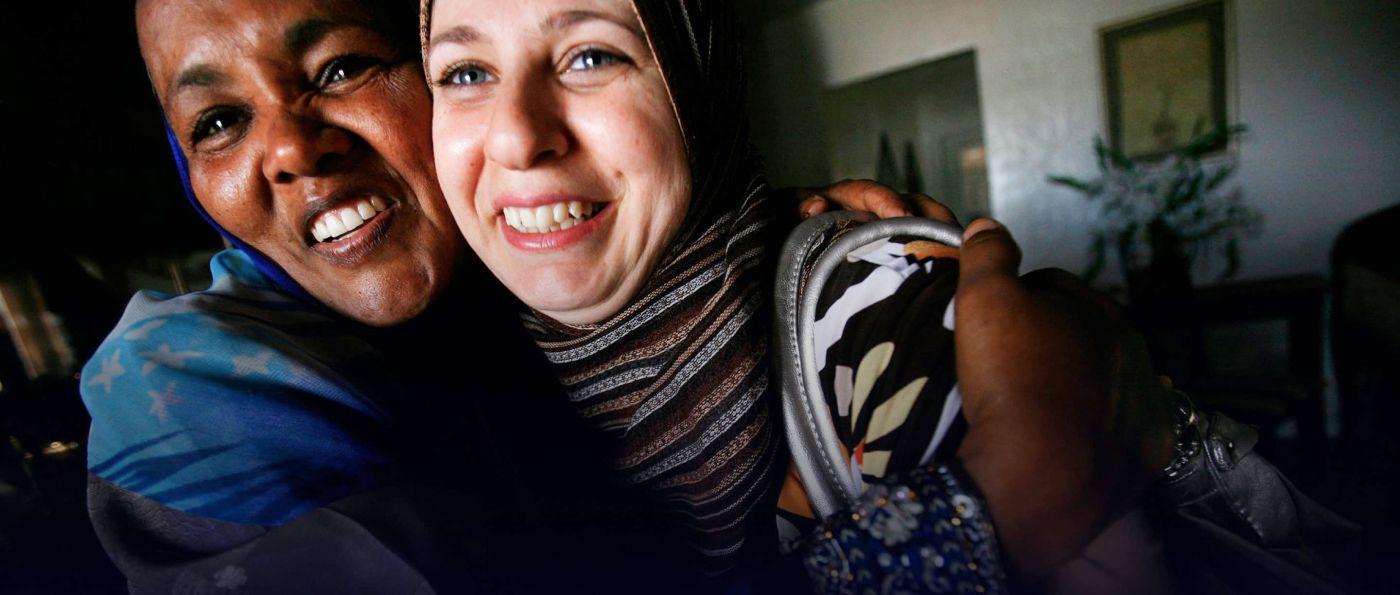Sponsor people seeking refuge in the U.S.
Welcome Connect allowed Americans to offer safety and community to newcomers fleeing violence and persecution.


Alert
As of May 30, 2025, humanitarian parole status for people sponsored through the CHNV program is terminated.
Latest Updates
What impact will policy changes have on newcomers, refugees, and sponsorship programs? Check out our latest explainers to learn more.
Sponsorship FAQs
I’m signed up or have applied to sponsor someone through the Welcome Connect platform. What happens next?
What’s the latest on CHNV?
On June 12, 2025, the Department of Homeland Security announced that it began sending termination notices for humanitarian parole status and work authorization to individuals who arrived in the U.S. through the Processes for Cubans, Haitians, Nicaraguans, and Venezuelans (CHNV) sponsorship program.
Individuals affected received notification through their myUSCIS account.
If a newcomer you know has been impacted by this decision:
- Get legal help immediately: All individuals with a primary status of humanitarian parole should consult an immigration attorney immediately. Find an immigration attorney through the American Immigration Lawyers’ Association search tool.
- Consult our parole termination resources hub, which includes resources to understand newcomers’ rights and possible next steps.
- Sponsors can consult our guide to alternative legal options for humanitarian parolees to seek professional legal counsel.
What’s the latest on U4U?
As of Jan. 28, 2025, the U.S. government has paused the Uniting for Ukraine (U4U) program. No new U4U applications are being accepted, pending cases won’t be processed, and no new travel authorizations are being issued.
In Aug. 2025, U.S. Citizenship and Immigration Services (USCIS) resumed processing U4U renewal (re-parole) applications for Ukrainians who are here in the U.S. Ukrainian newcomers who have already arrived in the U.S. via U4U may be eligible for re-parole. However, the pause on new U4U applications for Ukrainians outside of the U.S. is still in place. For more information, see this guidance by the Ukraine Immigration Task Force on how to submit a re-parole application and when to consider expedited processing.
If your U4U beneficiary is still awaiting a renewal for parole or work authorization, we encourage you to contact your congressional representative and submit a constituency request for their staff to file a congressional inquiry to USCIS checking on the status of their case. You can reference our contact your representative guide to learn how to submit this request.
To understand eligibility for alternative legal status options, check out our guide to alternative legal options for humanitarian parolees and seek legal advice from an immigration attorney.
What happens to my pending application or approved sponsorship if the newcomer hasn’t arrived yet?
With the pause of the U4U program and the end of the CHNV program, pending applications or approved sponsorships for newcomers that have not arrived will not be processed.
These programs are not accepting new applications, pending applications will not be processed, and no new travel authorizations are being issued. We are closely monitoring official updates and will share further information as it becomes available.
If you have questions about a specific case, you can ask your congressional representatives to follow up directly with USCIS on your behalf. Use our guide for information on how.
Does the end of the CHNV program and pause to the U4U program mean the newcomer I sponsored lost their humanitarian parole status?
The DHS announced that it will terminate the humanitarian parole status for individuals who arrived in the U.S. through the CHNV program. Termination of parole will take effect 30 days after the official notice is published. The expected publication date of the notice is March 25, 2025, meaning parole would be terminated on April 24, 2025. Additionally, if an individual's parole is set to expire earlier, termination would occur on the expiration date. DHS intends to prioritize removing individuals from the U.S. who haven’t applied for another status, like TPS or asylum, by March 25, 2025. View our CHNV policy explainer page for more information and resources.
This order of termination is specific to individuals who were sponsored through the CHNV sponsorship program. It does not apply to individuals who arrived in the U.S. through U4U, however recent reports suggest the government may also terminate humanitarian parole status for this population. Individuals who arrived through U4U and do not have another status or a pending application for another status, such as TPS or asylum, should seek professional legal counsel and apply for alternative legal status, if eligible. Learn more about applying for another status in our guide to alternative legal options for humanitarian parolees.
Stories of Welcome
Americans across 12,000 zip codes in all 50 states changed lives through sponsorship.

Stories of Welcome
Tribeca film features family’s journey from Ukraine to the U.S. using Welcome Connect platform
August 09, 2023

Stories of Welcome
The power of connectivity: Welcome.US CEO Council partners provide newcomers with needed tech
November 14, 2024


